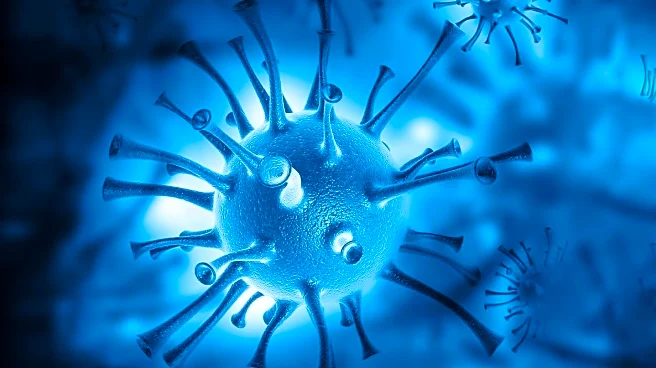What's Happening?
Recent research has revealed a significant interaction between gut microbiota and immune cells in exacerbating acetaminophen-induced acute liver injury (APAP-ALI). The study found that Gram-positive bacteria in the gut microbiota play a crucial role in triggering
immune responses that lead to liver damage. Specifically, the infiltration of Ly6Chi monocytes into the liver, aided by gut microbiota, exacerbates liver injury. The study also highlighted the protective role of liver-resident CD8+ TRM cells, which are activated by IL-15 secreted from hepatic CD103+ cDC1s, in mitigating liver damage. The findings suggest that the gut-liver immune axis is pivotal in the development and regulation of APAP-ALI, with potential implications for understanding liver failure caused by acetaminophen overdose.
Why It's Important?
This research is significant as it provides insights into the mechanisms underlying acetaminophen-induced liver injury, a common cause of acute liver failure in developed countries. Understanding the role of gut microbiota and immune cells in this process could lead to new therapeutic strategies for preventing or treating liver damage. The study highlights the importance of the gut-liver immune axis in liver health, suggesting that modulating gut microbiota or enhancing the protective immune response could be potential approaches to mitigate liver injury. This could have broader implications for public health, given the widespread use of acetaminophen and the prevalence of liver-related health issues.
What's Next?
Further studies are warranted to delineate the mechanisms underlying route-dependent immune responses in APAP-induced liver injury. Researchers may explore therapeutic interventions targeting the gut-liver immune axis to prevent or treat liver damage. Additionally, understanding the role of specific immune cells and cytokines in liver protection could lead to the development of targeted therapies. The findings may also prompt investigations into the impact of gut microbiota on other types of drug-induced liver injuries, potentially broadening the scope of research in liver health and disease.
Beyond the Headlines
The study raises ethical considerations regarding the use of antibiotics and their impact on gut microbiota, which could influence liver health. It also highlights the potential for personalized medicine approaches, where individual gut microbiota profiles could inform treatment strategies for liver injury. The research underscores the complex interplay between microbiota and immune responses, suggesting that a holistic approach to health that considers microbiota composition could be beneficial.















